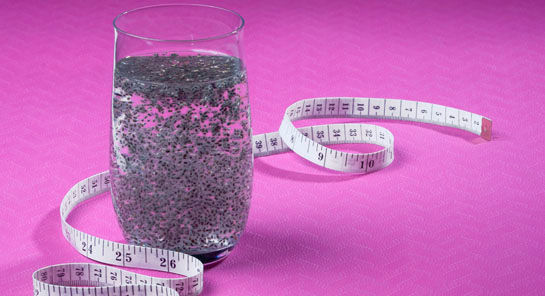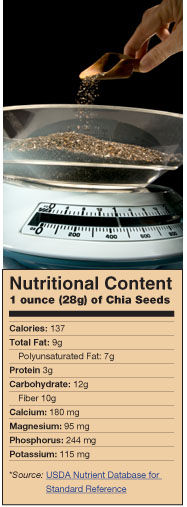
By Natalie Digate Muth, M.D., M.P.H., R.D.
Chia seeds are the latest in a long line of purported superfoods—promising weight loss, improved athletic performance and better heart health, among other things—but can they possibly live up to the hype? Here’s what the latest research on the health benefits of chia seeds shows…
When you hear “chia seeds,” you may immediately think of the infomercial hit of the ‘80s and ‘90s, inducing every young child to ask for a quick-growing furry plant friend. With minimal attention and just a few short weeks, the terracotta figurines sprout chia plants, providing the figurines a full head of hair or fur. While most people who have purchased these toys probably never ventured to eat the sprouting chia, it turns out that those chia seeds are nutrient powerhouses. Loaded with fiber, polyunsaturated fatty acids, protein (including all of the essential amino acids), and calcium and several other minerals, chia seeds are hitting the supermarkets and health-food stores with promises of weight loss, improved athletic performance, decreased risk of cardiovascular disease and a variety of other health benefits.

Chia seeds come from the plant salvia hispanica, a flowering plant belonging to the mint family. The seeds are native to Mexico and Central America and were probably a staple in the Mayan and Aztecan diets. While commonly consumed in Mexico and the Southwestern United States, only recently has the chia seed gained widespread attention as a potential superfood (Table 1). Few foods provide such a dense source of omega-3 fatty acids or as rich content of fiber (more than 40 percent of the recommended daily amount in a one-ounce serving).
The research evaluating whether or not the chia seed provides substantive, measurable health benefits lags behind the public interest in this latest purported miracle food. While the study results continue to be released, so far the data is mixed. One study of 75 overweight adults randomized half of the participants to a chia seed group while the half served as a control group. The chia seed group consumed 25 g twice per day for 12 weeks; the control group took a placebo supplement. The researchers predicted that the chia seed group would have increased weight loss and improved cardiovascular risk profile due to the chia seed’s high levels of satiety-inducing fiber and heart-healthy omega-3s. While the chia seed group did show higher levels of alpha-linoleic-acid, the omega-3 precursor to the heart-healthy eicosapentaenoic acid (EPA) and docosahexaenoic acid (DHA), their levels of EPA and DHA, as well as other markers of cardiovascular risk and body composition showed no difference between the two groups. The researchers concluded that the chia seeds provided no measurable benefit over the 12-week study (Nieman et al., 2009). However, it is possible that a longer-duration study, different amounts of the chia seeds or evaluation of different variables could lead to different results.
Other researchers investigated whether chia seeds could help improve endurance performance for exercise lasting longer than 90 minutes by serving as a source of carbohydrate loading. They compared carbohydrate loading with Gatorade alone to carbohydrate loading with 50 percent chia seeds and 50 percent Gatorade in six trained male athletes. Each study participant engaged in a one-hour run on a treadmill followed by a 10K time trial on a track after carbohydrate loading with Gatorade. Two weeks later, subjects completed the same exercise protocol after carbohydrate loading with the Gatorade-chia seed mix. Performance measures were equal with both regimens, suggesting that chia seeds could provide a healthier source of carbohydrate for endurance athletes. It is important to note, however, that the researchers did not measure degree of gastrointestinal distress, which could be higher with the chia seed group given the high fiber content of the seeds (Illian, Casey and Bishop, 2011).
A systematic review conducted to evaluate the current evidence for the health claims of chia seeds concluded that there is little scientific evidence to support the effectiveness of chia seeds in providing any health benefits (Ulbricht et al., 2009). That is not to say that chia seeds do not provide benefit—it is simply that there is too little quality research available to make any definitive conclusions or recommendations. Importantly, the data to date suggest that consumption of chia seeds is generally safe and does not pose a major health risk, other than for those individuals who are allergic to chia seeds (Ulbricht et al., 2009).
Overall, the chia seed could be an exceptional addition to a healthy and balanced eating plan. Simply substitute chia seeds for eggs or oil by mixing a tablespoon of chia seeds with one-quarter cup of water; use as a thickener for soups and puddings; or add chia seeds to an herb, seed or granola mix.
References
Illian, T.G., Casey, J.C., and Bishop, P.A. (2011). Omega 3 chia seed loading as a means of carbohydrate loading. Journal of Strength and Conditioning Research, 25, 1, 61–65.
Nieman, D.C. et al. (2009). Chia seed does not promote weight loss or alter disease risk factors in overweight adults. Nutrition Research, 29, 6, 414–418.
Ulbricht, C. et al. (2009). Chia (Salvia hispanica): A systematic review by the Natural Standard Research Collaboration. Review of Recent Clinical Trials, 4, 3, 168–174.
_____________________________________________________________________
 Natalie Digate Muth, M.D., M.P.H., R.D., is a pediatrics resident at UCLA Mattel Children’s Hospital, a registered dietitian and Board-certified Specialist in Sports Dietetics (CSSD), and an ACE Spokesperson. She is also an ACE-certified Personal Trainer and Group Fitness Instructor, and holds additional certifications with ACSM and NSCA. Natalie is the author of Eat Your Vegetables! And Other Mistakes Parents Make: Redefining How to Raise Healthy Eaters, and has also written more than 50 articles and book chapters. In addition, Natalie has completed several marathons, half marathons and triathlons.
Natalie Digate Muth, M.D., M.P.H., R.D., is a pediatrics resident at UCLA Mattel Children’s Hospital, a registered dietitian and Board-certified Specialist in Sports Dietetics (CSSD), and an ACE Spokesperson. She is also an ACE-certified Personal Trainer and Group Fitness Instructor, and holds additional certifications with ACSM and NSCA. Natalie is the author of Eat Your Vegetables! And Other Mistakes Parents Make: Redefining How to Raise Healthy Eaters, and has also written more than 50 articles and book chapters. In addition, Natalie has completed several marathons, half marathons and triathlons.